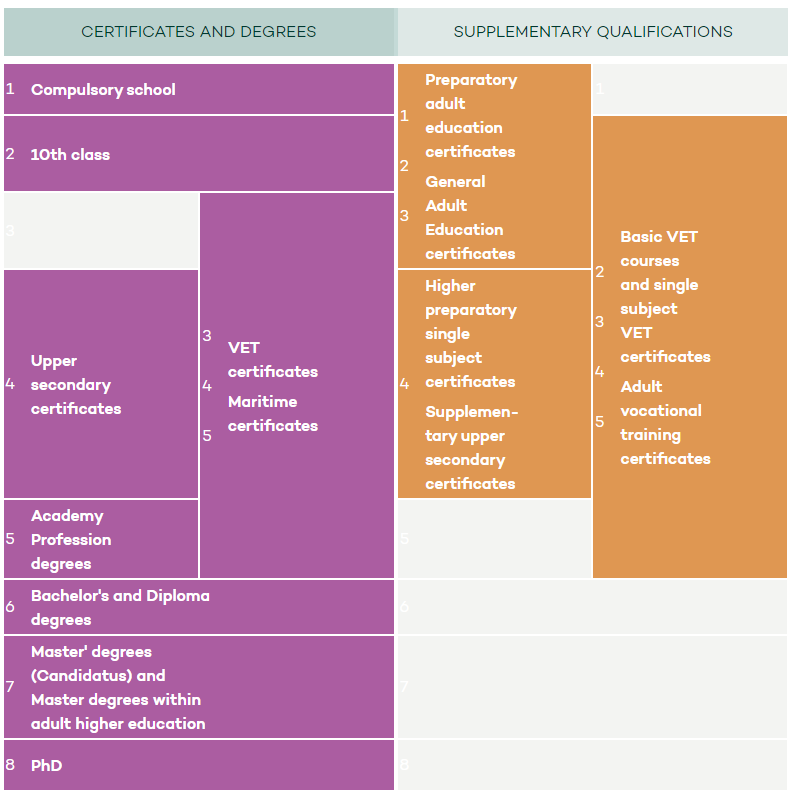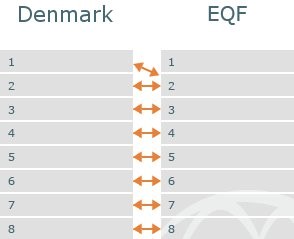Address
Eurydice Unit
Ministry of Higher Education and Science
Danish Agency for Science and Higher Education
Haraldsgade 53
DK-2100 Copenhagen Ø
Tel: +45 7231 7800
E-Mail: ufs@ufm.dk
Website
Background information and purpose
In 2006, the former Minister for Education launched the work of drawing up a Danish National Qualifications Framework for Lifelong Learning (NQF) covering the entire Danish education system in accordance with the European Qualifications Framework for Lifelong Learning (EQF).
An inter-departmental working group with representatives of the Ministry of Education (now the Ministry of Children and Education), the Ministry of Science, Technology and Innovation (now the Ministry of Higher Education and Science), the Ministry of Culture, and the Ministry of Economic and Business Affairs developed the NQF. In addition, a number of stakeholders from the Danish education system were involved.
The purpose of the NQF is to support transparency in the Danish education system and promote mobility and lifelong learning by:
- Creating an overview of recognised programmes and progression routes both within the ordinary education system and within the parallel system of adult education and continuing training;
- Facilitating the mutual recognition of Danish and international qualifications by linking the NQF and the EQF.
In 2009, the Minister for Education, the Minister for Science, Technology and Innovation, the Minister for Culture, and the Minister for Economic and Business Affairs approved a proposal for a Danish NQF and its implementation. Inclusion of existing degrees and certificates into the NQF was carried out from August 2009 to the end of 2010. Inclusion of degrees for higher education takes place as part of the accreditation procedure.
In 2019, the ministries, in collaboration with the Danish Accreditation Institution, adopted a set of criteria and a procedure making it possible to include qualifications from private institutions and from public institutions outside the three ministries’ field of responsibility. The Danish Accreditation Institution carries out level assessments and places the educational programmes in the NQF based on the adopted criteria.
The intention of including qualifications from private institutions and public institutions outside the ministries’ field of responsibility is:
- To make students’ learning outcomes more transparent;
- To improve the basis for admission and credit transfer into formal education;
- To give participants in non-formal education better protection and confidence that providers of non-formal education live up to certain standards.
The National Qualifications Framework and its design
The NQF is a comprehensive, systematic layered classification of publicly recognised qualifications that students can acquire within the Danish education system from primary and lower secondary level to university level and within the area of adult education and continuing training. The NQF covers:
- Publicly recognised certificates and degrees;
- Publicly recognised certificates for supplementary qualifications;
- Certificates for private qualifications having received a level assessment and referenced to a level of the NQF based on official criteria and procedures.
The NQF has eight levels. Degrees and certificates are placed at one of the eight levels based on learning outcomes. The level descriptors express learning outcomes in terms of knowledge, skills, and competences. Education certificates and certificates for supplementary qualifications are placed at level 1-5 and degrees in higher education are placed at level 5-8.
The different types of certificates and degrees in the Danish education system and their location in the NQF appear from the figure below.

For a description of each level in the NQF and the learning outcome, please visit Levels in the Qualifications Framework.
Compatibility with the European Qualifications Framework for Lifelong Learning
The eight levels of the NQF are designed to correspond to the levels of the EQF, which also contains eight reference levels described in terms of learning outcomes.
The NQF levels 2-8 correspond to the same levels in the EQF, while the Danish level 1 corresponds to the EQF level 2. This also appears from the figure below.
Danish NQF levels and EQF levels

A special qualifications framework for higher education, the Danish Qualifications Framework for Higher Education (NQF-HE), was implemented in 2003. The present NQF-HE came into force in 2008. It has been certified and found compatible with the overarching framework of qualifications for the European Higher Education Area (QF-EHEA).
The Danish higher education system is organised into four qualification levels:
- Academy profession level;
- Bachelor’s level;
- Master’s level;
- PhD level.
The academy profession level is comparable to the short cycle and the Bachelor’s level is comparable to the first cycle. The Master’s level corresponds to the second cycle and the PhD level corresponds to the third cycle.
The level descriptors for levels 6, 7, and 8 of the NQF are identical with the three highest level descriptors of the NQF-HE, i.e. Bachelor’s, Master’s and PhD level, respectively. For level 5 of the NQF, the level descriptor is broader than the one applying to the Academy Profession level of the NQF-HE. This is because some of the qualifications at level 5 are not a part of the NQF-HE.
References
Bibliography
Ministry of Higher Education and Science, 2020a: About the Qualifications Framework. [Accessed 15 August 2022]
Ministry of Higher Education and Science, 2020b: Background. [Accessed 9 August 2022]
Ministry of Higher Education and Science, 2020c: Cross-border comparison of qualifications. [Accessed 9 August 2022]
Ministry of Higher Education and Science, 2021: Danish Qualifications Framework for Higher Education. [Accessed 9 August 2022]
The Danish Accreditation Institution, 2018: Level Assessment of Private Education et al. (Niveauvurdering af private uddannelser m.fl.). [Accessed 15 August 2022]
The Danish Evaluation Institute, 2009: Self-certification: Verification of compatibility of the Danish National Qualifications Framework for Higher Education with the Framework for Qualifications of the European Higher Education Area. [Accessed 9 August 2022]
The Danish Evaluation Institute (Danmarks Evalueringsinstitut), 2013: Evaluation of the Danish Qualifications Framework for Lifelong Learning (Evaluering af den danske kvalifikationsramme for livslang læring). [Accessed 15 August 2022]
Legislation and official policy documents
Legal Information (Retsinformation), 2021: Ministerial Order on accredication of higher education institutions and approval of higher education programmes (Bekendtgørelse om akkreditering af videregående uddannelsesinstitutioner og godkendelse af videregående uddannelser), BEK no. 1558 of 02/07/2021. [Accessed 15 August 2022]
